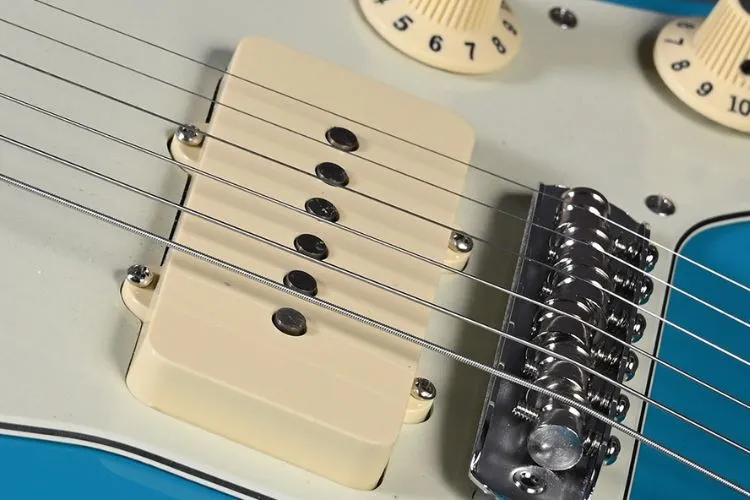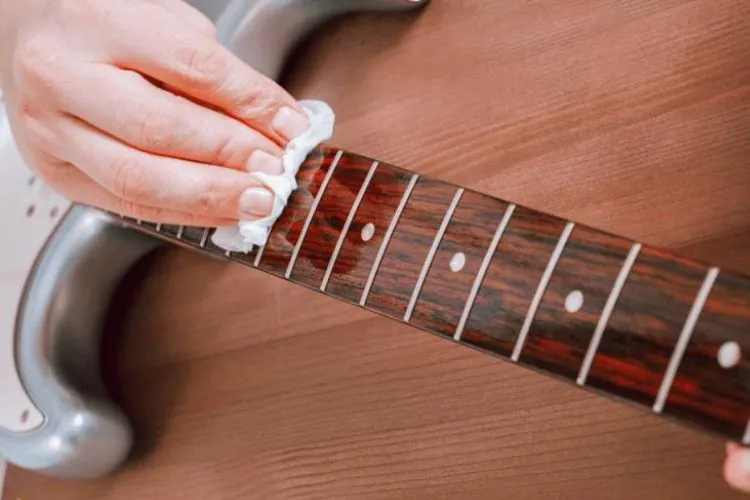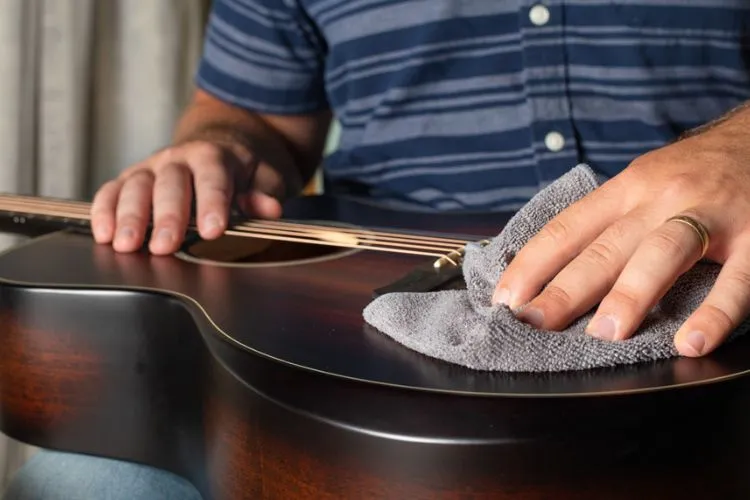Guitar pickups are pivotal in defining the tone and overall sound output of electric guitars. They capture the vibrations of the strings and convert them into electrical signals that your amplifier can then project.
However, like any other part of the guitar, pickups accumulate dust, grime, and corrosion over time, which can dampen their performance.
Regular cleaning not only preserves their sound clarity but also extends their lifespan. This article will guide you how to clean guitar pickups safely and effectively.

Contents
🎶Types of Guitar Pickups
Before diving into the cleaning process, it’s important to understand the types of pickups your guitar has, as this can affect how you clean them. Single-coil pickups are known for their bright, crisp sound but can be susceptible to interference and noise.
They typically require gentle cleaning to avoid damaging their delicate wires. Humbucker pickups, on the other hand, use two coils to cancel out noise and usually have a warmer tone.
They are generally more robust but still require careful cleaning to maintain their sound quality. Active pickups, which use a battery to boost the signal, and passive pickups, which do not, may also have different cleaning considerations due to their electronic components.
🎶Tools and Materials Needed
The right tools are essential for cleaning your guitar pickups without causing damage. You will need a soft, lint-free cloth, cotton swabs, isopropyl alcohol, and a small brush or old toothbrush.
These materials are gentle on the pickups and effective at removing dirt without leaving residue. Always avoid using water or harsh chemicals, as they can corrode metal parts and damage the pickup’s wiring.
🎶Pre-cleaning Preparation
Before you start the cleaning process, ensure your guitar is unplugged and, if possible, remove the strings. This not only gives you better access to the pickups but also prevents any accidental damage to the strings or neck.
Check the pickups for visible signs of dirt, rust, or other issues. This initial assessment will help you determine the extent of cleaning needed.
🎶How To Clean Guitar Pickups? Cleaning Process

Exterior Cleaning
Begin by gently dusting the surface of the pickups with a soft brush to remove loose dirt. Then, take your lint-free cloth and lightly wipe down the pickups to eliminate any remaining dust.
If you encounter stubborn grime or oxidation, lightly dampen a cotton swab with isopropyl alcohol and carefully clean the affected areas. Avoid applying too much pressure or saturating the pickups with alcohol, as this could damage their internal components.
In-depth Cleaning (Optional)
For those experienced with guitar maintenance, removing the pickups for a more thorough cleaning might be an option. If you choose to do this, carefully unscrew and lift out the pickups, noting their original position for reassembly.
Clean underneath and around the pickups using the same gentle methods as for the exterior. Once clean, ensure everything is dry before reassembling the guitar.
🎶Post-Cleaning Care
After cleaning, ensure all parts of the guitar and the pickups are completely dry. If you removed the strings, restring your guitar, ensuring they are properly aligned and tuned.
Test the guitar to ensure the pickups are functioning correctly and that there are no issues with the sound output.
🎶Maintenance Tips
Regular cleaning is essential for maintaining your pickups’ performance. Depending on your usage, a cleaning routine every few months can prevent the buildup of dirt and corrosion.

Store your guitar in a dry, dust-free environment and consider using a cover to protect it when not in use. Additionally, be mindful of substances like sweat and oils from your hands, which can accelerate the deterioration of metal parts.
🎶Troubleshooting
After cleaning, if you notice any issues with sound quality or output, check the connections and ensure everything was reassembled correctly. If problems persist, it might be time to seek professional help, as the issue could be beyond simple cleaning.
Common Issues with Dirty Pickups
Guitar pickups are vital to the sound production of electric guitars, capturing string vibrations and converting them into electrical signals.
However, over time, pickups can accumulate dirt, dust, and undergo corrosion, significantly impacting their performance and the overall sound quality of the instrument. Understanding these common issues can help players maintain their guitars and ensure optimal sound output.
Dirt and Dust Accumulation
Dirt and dust are the most common contaminants that can affect guitar pickups. When these particles accumulate on and around the pickups, they can dampen the vibrations of the strings, leading to a muted, less vibrant sound.
The accumulation of dust and dirt can also interfere with the magnetic field that the pickups use to detect string vibrations, resulting in a weaker signal and a significant loss of clarity and high frequencies.
In severe cases, excessive dirt can even cause the pickups to produce a buzzing or humming noise, further degrading the quality of the sound.
Corrosion and Oxidation
Corrosion and oxidation are more severe issues that can arise from neglect, exposure to moisture, or playing in environments with high humidity. Metal components of the pickups, particularly the pole pieces, can start to rust over time.
This not only deteriorates their physical appearance but can also affect their magnetic properties, leading to a reduction in their ability to pick up string vibrations accurately. Corroded pickups may produce a weaker, more distorted signal, which can significantly alter the tonal characteristics of the guitar.
Impact on Sound and Performance
The presence of dirt, dust, and corrosion can have several impacts on the sound and performance of guitar pickups:

- Loss of Clarity and Detail: As contaminants dampen the string vibrations, the resulting sound may lack clarity and detail. Players may notice that their guitar no longer produces the crisp, clean tones it once did.
- Reduced Output Level: Dirt and corrosion can weaken the magnetic field of the pickups, leading to a reduced output level. This means the guitar may sound quieter than usual, and players may need to turn up their amplifier to achieve the same volume levels.
- Altered Tone: The accumulation of contaminants can change the EQ profile of the pickups. This may result in an unintended increase in bass or a decrease in treble frequencies, leading to a muddy or dull sound.
- Noise and Interference: Dirty pickups are more susceptible to picking up electromagnetic interference, resulting in unwanted noise such as humming or buzzing. This can be particularly problematic in recording situations or during live performances.
Solutions and Preventative Measures
To mitigate these issues, regular cleaning and maintenance of the pickups are essential. Using a soft, dry cloth to gently wipe away surface dust and a small brush or toothpick to remove debris from hard-to-reach places can significantly reduce the buildup of contaminants.
For more severe cases of dirt and corrosion, using a small amount of isopropyl alcohol on a cotton swab can help clean the pickups more thoroughly. However, caution must be taken not to oversaturate the pickups or damage any delicate components.
In addition to regular cleaning, storing the guitar in a dry, temperature-controlled environment can help prevent corrosion and oxidation. Using a guitar case when the instrument is not in use can also protect it from dust and other environmental factors.
By understanding the common issues associated with dirty pickups and implementing regular cleaning and maintenance routines, players can preserve the sound quality and performance of their electric guitars, ensuring a vibrant and dynamic musical experience.
You may also find useful: How Much Does It Cost To Restring A Guitar?
🎶frequently asked question (FAQs)
Clean your pickups every few months or as needed depending on use and environmental factors.
It’s best to avoid water as it can cause rust and damage internal components. Use isopropyl alcohol and a dry cloth instead.
Minor rust can be cleaned with a gentle application of isopropyl alcohol, but significant rust may require professional attention.
If you notice a decline in sound quality or visible dirt and grime, it’s time for a cleaning.
Yes, but ensure the battery is removed before cleaning to avoid any risk of damage or electrical issues.
Conclusion:
Regularly cleaning your guitar pickups is a straightforward but crucial part of maintaining your instrument’s performance and longevity.
By following the steps outlined in this guide, you can ensure that your pickups remain in top condition, contributing to a clear, vibrant sound.
